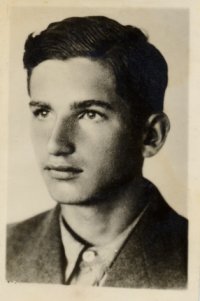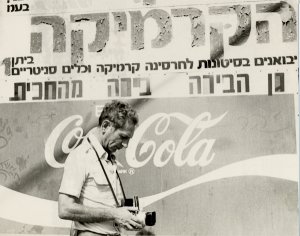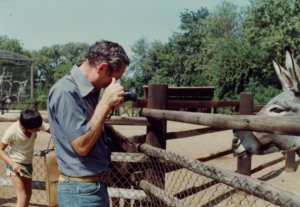Biography

Benjamin Fishman was born in Warsaw, Poland, on 21 November 1926, the
firstborn son of Moses and Teresa Fishman.
He grew up in Krochmalna Street, not far away from the place where the
Jewish Ghetto Wall would be later built. When the Germans
invaded his beloved city on September first 1939, the day he was to start
another year at school, as he used to tell me once and again, he was
just thirteen years old. Nevertheless, he and his father were
politically minded and keenly aware of the pending catastrophe.
While all their relatives and friends were complacent and refused to
see what was going on, father and son crossed the border eastwards to
the USSR, where they sought refuge from the Nazis. After a while his
mother and younger brother Daniel joined them there. At first Benjamin's family
lived at Minsk, the capital of White Russia, but in 1941, as the
Germans invaded the U.S.S.R. and the front was advancing nearer and
nearer, they escaped eastward by foot and by train, until they
reached Middle Asia. There they settled down at Osh, a small town in
Kyrgyzstan, at the foot of Pamir high mountains, with oriental mud
houses and exotic appeal, where they stayed until the war was over.
Many Russians, Poles and Jews, as well as the staff and students of
the Rostov University fled away from the Germans to Osh, whose local
population consisted of Uzbeks and Kyrgyz.
In this university
Benjamin studied Phys-Math (Physics-Mathematics), after having
studied History at the local Institute.

By 1945, when World War II ended, the Fishman family,
like many other Polish-Jewish families, returned to their homeland.
But Poland was then most hostile to Jews, and everyone was leaving.
So Benjamin joined a group of young Halutzim and Halutzot belonging to
the HaOved HaZioni Movement, then called "Kibbutz" although more
commonly known as Hachshara. With his Kibbutz he traveled to Italy,
and from the Refugee Camp there he went aboard a Ma'apilim Ship to
Eretz Israel: he was an idealist, a Zionist. But the British authorities
would not let them in, and like many others they ended up at a Ma'apilim
Camp in Cyprus. Benjamin stayed at the Cyprus camp for two years, during
which time he learned no less than three languages all by himself: Hebrew
(aided by the vocalized Gordon Exegesis to the Bible), English and
French. (He already knew Polish, Russian, Yiddish and Italian, which he had
learned in Italy. In the years to come he would teach himself Spanish,
Portuguese, German, Arabic, Persian, Latin and Ancient Greek as well.)
In 1949 he and his friends were finally out of Cyprus, establishing a
frontier Kibbutz in the Negev. There he lived until the Kibbutz came
apart in the early Fifties, when he joined his parents and brother,
who by then had immigrated to Israel, and lived with them at Jaffa.
Later on he began working at designing and construction of telephone
exchanges. He and Dalia Tessler first met in 1956 and married a year afterwards.
If only he lived for four years more, they would have celebrated their fiftieth
anniversary together.

In the Sixties Benjamin finished his studies at the Tel Aviv University and got his B.Sc. in Mathematics, and then his children were born. All along those years Benjamin never stopped photographing and creating glorious works of art, first in black and white and then in colour. But his real dream came true in 1985, when he retired and dedicated himself to art, studying History of Art and Classical Literature at the Tel Aviv University and creating his colour photographs, most of them dramatically staged. They were exhibited twice in Israel and once in Germany, and he went on, processing his images into computerized works of art. He would have continued to bring things of beauty into this world and joy to everybody's heart were it not for the terrible illness that struck once and again, and finally took him away in the prime of his creative life, this man of blessed memory, our Benjamin.
Died in Tel Aviv, July 27, 2003




